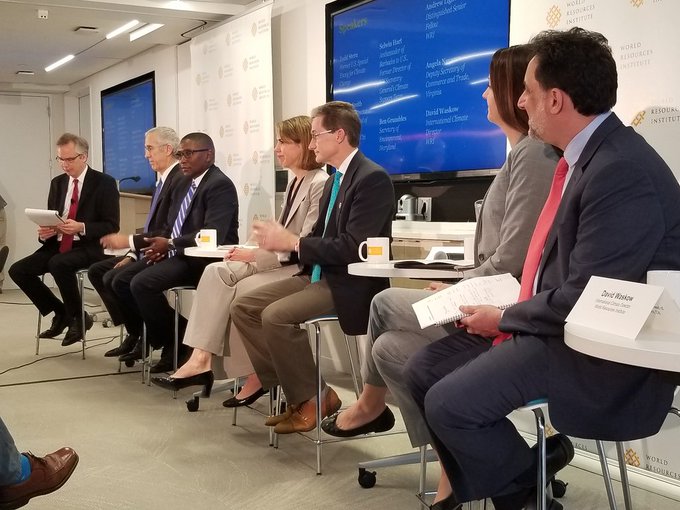One Year Later, Climate Leaders are Forging Ahead — Without the Trump Administration
 One year ago, President Trump announced that the United States would withdraw from the Paris climate accord, raising uncertainty about the future of the landmark agreement. On May 30th, 2018, the World Resources Institute (WRI) convened a panel of climate policy leaders to ask the question: Has the world moved on since President Trump’s announcement?
One year ago, President Trump announced that the United States would withdraw from the Paris climate accord, raising uncertainty about the future of the landmark agreement. On May 30th, 2018, the World Resources Institute (WRI) convened a panel of climate policy leaders to ask the question: Has the world moved on since President Trump’s announcement?
In a panel moderated by WRI senior fellow Andrew Light, Paula Caballero, global director of WRI’s Climate Program, gave the room reasons for both optimism and caution. “Trump can announce what he will, but the reality in the US and around the world is that efforts to tackle climate continue.”
States and businesses are doing what they can to fill the void left by federal inaction, which is reflected in bipartisan initiatives, such as the U.S. Climate Alliance and America’s Pledge. “States, cities, and businesses representing more than half of the United States population have adopted GHG targets,” said Caballero, adding that “if they were a country, these US states and cities alone would be the third largest economy in the world. That matters.” Still, Caballero cautioned that “if we’re really honest, we need a lot more ambition.”
For Todd Stern, former U.S. special envoy for climate change, the global response to President Trump’s announcement has been a “mixed bag.” On one hand, other countries have remained in the agreement, something that “wasn’t a foregone conclusion.” On the other hand, “it’s really damaging for the United States to be on the way out.”
Stern said the absence of the US could lead some countries to pull back on their commitments and undermine the development of “global norms and expectations” around carbon dioxide emissions.
Selwin Hart, Ambassador of Barbados to the US, said “the coalition that delivered the Paris agreement remains strong,” but “it is absolutely imperative to have the US at the table,” adding that “were it not for the leadership of the United States, we would not have had the Paris agreement.” Still, “countries are not going to wait” for the US to take action.
WRI’s David Waskow echoed this point, citing international determination in response to the US withdrawal, including the India-led International Solar Alliance and the Africa Renewable Energy Initiative, which are examples of “a change, globally, in the types of leadership that we have,” with “many more actors in the mix and driving forward action.”
This new kind of leadership can also be found at the state, business, and non-governmental organization (NGO) levels. Valerie Smith, global head of corporate sustainability at Citigroup, pointed to her firm’s financing of climate solutions as an example of both good global citizenship and good business.
Maryland Secretary of the Environment Ben Grumbles noted he was sent to the recent COP23 in Bonn, Germany by Republican governor Larry Hogan, suggesting the climate need not be a partisan issue.
Virginia deputy secretary of commerce and trade Angela Navarro stated that, prior to the Paris Agreement, “a lot of the climate action in the United States was happening at the state level,” but “the importance of the work states are doing has only been amplified since the announcement from President Trump a year ago.” An example of this state-level work can be found in the Regional Greenhouse Gas Initiative (RGGI), a coalition of Northeastern and Mid-Atlantic States founded in 2009 to price CO2 emissions from the energy sector.
Secretary Grumbles (also chair of the RGGI Board of Directors) touted RGGI’s track record, saying that it had slashed emissions while raising $2.9 billion for member states to invest in climate solutions.
Virginia is working to join RGGI, which would make it the first southeastern state to regulate greenhouse gas emissions. New Jersey, formerly a member state, is also eager to re-join the coalition. “With these eleven states,” said Grumbles, “we’ll have somewhere between the fourth and the fifth-largest economy in the world.”
The lingering question, however, is whether these state and market efforts will be enough for the US to meet its Paris goal of reducing greenhouse gas emissions by 26-28% from 2005 levels by 2025 in the absence of leadership from the U.S. federal government.
While new leadership may be emerging to fill that void, the environment is already sending dangerous warning signals. This last winter, the maximum extent of arctic sea ice hit a near-record low.
Meanwhile, arctic permafrost is beginning to melt, releasing frozen carbon and methane gas stored in the soil into the atmosphere and raising fears of initiating a dangerous warming feedback loop that has been called “a ticking time bomb.”
Scientists have found that rainfall from Hurricane Harvey was made worse because of climate change, foreshadowing what could be a more frequent phenomenon in the future. And in Puerto Rico, researchers now estimate that more than 4,600 American citizens died in the aftermath of Hurricane Maria, making that storm more than twice as deadly as Hurricane Katrina.
With this in mind, the call to action sounded by Caballero at the beginning of the panel rang the loudest at its end: “Whether we do act today — or whether we don’t act today — is going to determine what the world will look like for centuries to come.”
See event moderator and WRI senior fellow Andrew Light’s writing on this topic here.
This article was written by Andrew Wright and first appeared in ASLA’s THE DIRT.
